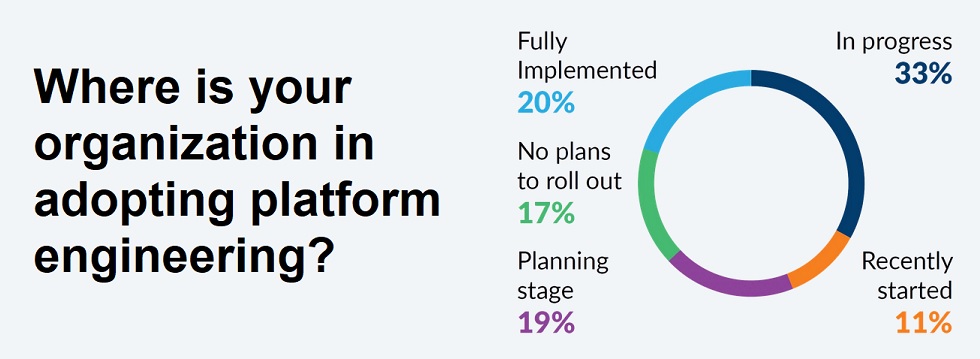JFrog announced a new machine learning (ML) lifecycle integration between JFrog Artifactory and MLflow, an open source software platform originally developed by Databricks.
Platform engineering is quickly gaining traction within IT organizations, becoming an established practice for software development teams — 83% of respondents have either fully implemented platform engineering or are in some phase of implementation, according to Platform Engineering in 2023: Rapid Adoption and Impact, a new report from CloudBees.
Platform engineering is the discipline of designing and building internal developer platforms (IDPs), toolchains, and workflows that enable self-service capabilities for software engineering teams.
IT leaders are being continuously challenged to do more with less. According to various research studies, developers spend as little as 12.5% to 30% of their time per week writing code. This is driving IT and DevOps leaders to urgently find new ways to enhance developer productivity. Platform engineering has come to the forefront due to its ability to establish best practices for improving developer productivity and developer experience (DevEx). Platform engineering practices have already demonstrated success in shifting significant workload away from developers.
Data from the survey shows significant levels of platform engineering adoption or planned adoption (83%), with:
■ 20% fully implemented
■ 33% in progress
■ 11% recently started
■ 19% in the planning stages
Only 17% of respondents say they have no plans to roll out platform engineering.

The top five drivers of platform engineering each account for approximately 20% of responses and illustrate the critical and broad benefits of platform engineering for developers and DevOps teams. Drivers for adoption include:
■ Developer productivity (21%)
■ Continuous integration and continuous delivery (CI/CD) pipeline implementation (20%)
■ Standardization of tools and processes (20%)
■ Security enhancements (20%)
■ Infrastructure as code (19%)
Business Impact
As DevOps boomed over the last 10 years, platform engineering's rise to prominence was often attributed to the "We forgot about the developers!" phenomenon. Many things shifted left during the rise of DevOps, further burdening developers and serving as a distraction from coding and creating new innovation. Organizations invest in platform engineering to address multiple needs.
Aligned with the focus on developer productivity, three of the top five use cases for platform engineering are:
■ Management of development, test and production environments (22%)
■ CI/CD pipeline management (21%)
■ Developer Platform as a Service (18%)
Objectives and success measures
Virtually all of the platform engineering objectives rated most important relate to DevEx and improving productivity for developers. The three most highly-ranked objectives are:
■ Self-service for developers (29%)
■ Easy adoption (25%)
■ Meeting developer needs (20%)
The measures of success for platform engineering teams include:
■ Developer productivity (23%)
■ Internal KPI attainment (19%)
■ Cost control (16%)
■ Reigning in tool sprawl (13%)
Finally, the survey shows that platform engineering's home within an organization varies, but it is most commonly placed within:
■ Cloud engineering (30%)
■ Infrastructure groups (25%)
■ Development (20%)
■ Shared services (13%)
■ Operations (13%)
"Far from replacing DevOps, platform engineering has gained its own focus and set of engineering disciplines that are complementary to DevOps," said Sacha Labourey, Chief Strategy Officer, CloudBees. "The survey data shows that platform engineering is being widely adopted and is seen by many organizations as a key element in efforts to maximize efficiencies for software development."
Industry News
Copado announced the general availability of Test Copilot, the AI-powered test creation assistant.
SmartBear has added no-code test automation powered by GenAI to its Zephyr Scale, the solution that delivers scalable, performant test management inside Jira.
Opsera announced that two new patents have been issued for its Unified DevOps Platform, now totaling nine patents issued for the cloud-native DevOps Platform.
mabl announced the addition of mobile application testing to its platform.
Spectro Cloud announced the achievement of a new Amazon Web Services (AWS) Competency designation.
GitLab announced the general availability of GitLab Duo Chat.
SmartBear announced a new version of its API design and documentation tool, SwaggerHub, integrating Stoplight’s API open source tools.
Red Hat announced updates to Red Hat Trusted Software Supply Chain.
Tricentis announced the latest update to the company’s AI offerings with the launch of Tricentis Copilot, a suite of solutions leveraging generative AI to enhance productivity throughout the entire testing lifecycle.
CIQ launched fully supported, upstream stable kernels for Rocky Linux via the CIQ Enterprise Linux Platform, providing enhanced performance, hardware compatibility and security.
Redgate launched an enterprise version of its database monitoring tool, providing a range of new features to address the challenges of scale and complexity faced by larger organizations.
Snyk announced the expansion of its current partnership with Google Cloud to advance secure code generated by Google Cloud’s generative-AI-powered collaborator service, Gemini Code Assist.
Kong announced the commercial availability of Kong Konnect Dedicated Cloud Gateways on Amazon Web Services (AWS).
Pegasystems announced the general availability of Pega Infinity ’24.1™.




